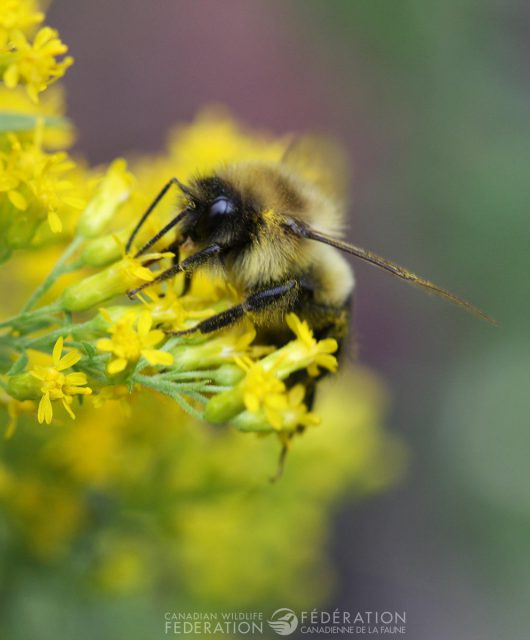Did you know Canadians spend about 90 per cent of their time indoors?
We need to change this stat! We’ve got 17 reasons to spend some serious time outdoors with the little ones in your life. So, start reading then pull out your toque and mitts and head out.
For the Kids

- Even though it’s still making headlines, it shouldn’t be news to anyone – kids today are spending too much time inside and not enough time in nature. A recent U.K. study conducted by the National Trust showed that of the 1,651 children surveyed, only half could tell the difference between a bee and a wasp but 90 per cent could identify Yoda. This study focused on U.K. children, but would Canadian kids fare any better?
- A 2001 study in Environment and Behaviour found that kids aged seven to 12 who were diagnosed with Attention Deficit Disorder, functioned better after doing activities in the great outdoors (like fishing) than activities inside.
- Allowing our kids to play outside can have benefits for wildlife as well. If a child understands their connection to the natural world they’re more likely to grow up as responsible environmental stewards and pass these values onto their own children. Understanding nature can mean that the bumblebee will be appreciated for the gifts it provides us through pollination rather than feared for the possibility that it might sting. This new and valuable perspective can mean new possibilities for conservation in Canada.
- According to the Canadian Fitness and Lifestyle Research Institute, kids that get involved in unorganized physical activities or sports afterschool take 1,300 more steps a day than other Canadian children.
- It is thought by many that the most significant benefit of outdoor play is the impact it has on psychological health. Some studies suggest that the amount of natural space surrounding a child’s living environment is closely related to the incidence of psychological disorders (most common being depression and anxiety). Kids tend to be overburdened by an increased workload from school and extracurricular activities and therefore have a tendency toward higher stress levels. In fact, studies have shown that those children with higher amounts of exposure to the natural world actually had lower stress levels than those children that lack an adequate amount of time spent outdoors.
- Having a hard time getting the kids to bed on time? Getting outside during the day can help to reset your circadian rhythm (your body’s internal clock that tells it to wake and sleep according to the rising and setting of the sun), helping send us all to snoozeland.
- Physical outdoor play has been shown to reduce the risk of developing chronic diseases such as coronary heart disease, type 2 diabetes, osteoporosis, obesity, and certain types of cancer. Ample physical activity also plays an essential role in a child’s healthy development and growth, and can help improve asthmatic symptoms, ease chronic pain, and improve myopia.
- Another important benefit of outdoor play is the social aspect – kids tend to group together and play as a unit outdoors, whereas indoors the tendency is to play individually at video or computer games. When children play together outside, it encourages them all to use their imaginations and invent fun and creative games for all to enjoy, and it may encourage kids who may otherwise shy away from social interaction to join in.
- What schools score higher on standardized tests in reading, writing, listening and math? Schools with environmental education programs!
- A University of Essex study found that doing physical activity outside can actually drive down tension, anger and even anxiety.
For the Kids at Heart

- Try forest bathing! Visiting a forest may boost your immune system by upping the number and activity of the super cells that fight off cancer cells. It turns out as little as 40 minutes of walking in a forest will result in improved mood and feelings of vigour. If you want to experience the full-blown benefits, consider spending some time walking in a forest setting every day.
- Nature cuts down on crime! One study found that Chicago dwellers whose apartments were surrounded by green space reported less violent crimes, including domestic violence, than people who didn’t have views of greenery from their homes. A similar study conducted on a rough Manchester, England neighbourhood found that after planting trees in the area, calls to Manchester police dropped from 800 to 64 a year. Nature even helps within prisons. Researchers in Oregon are finding that crime is reduced within the prison when prisoners are shown pictures of nature, and also the levels of stress that prison guards carry is also reduced
- Researchers at the University of Michigan found that 45 minutes of walking in a park can boost cognitive performance and help you unwind. A walk in nature will give you plenty of exciting things to look at but also gives your brain muscles some time to recharge. Don’t cheat and take a walk downtown. Walking in urban environments requires more concentration – you have to tune out traffic, people, ads, and much more. As such, your mind doesn’t get a chance to relax.
- A study from the University of California and Berkley followed the recovery rates of patients recovering from gallbladder surgery. Half of the patients’ rooms faced a brick wall and the other half faced a park. The patients facing the park recovered twice as quickly as their counterparts.
- Obviously a walk in the park is good for you. But if you want to step it up a notch, hit the trails; hiking will burn 438 calories per hour.
- One U.K. study found that when people got out into the fresh air and enjoyed green spaces during exercise, 60 per cent of them felt more confident during the first five minutes of their workout. And that confidence lasted the entire duration of their sweat-a-thon.
- Did you know that 1.1 million Canadians are deficient in vitamin D? A little sunshine would help! Between the vitamin D you get from the sun’s rays to the huffing and puffing from walking outside, you’ll lower bad cholesterol, amp up good cholesterol, keep your blood pressure in check, and even reduce your risk of getting type 2 diabetes.





